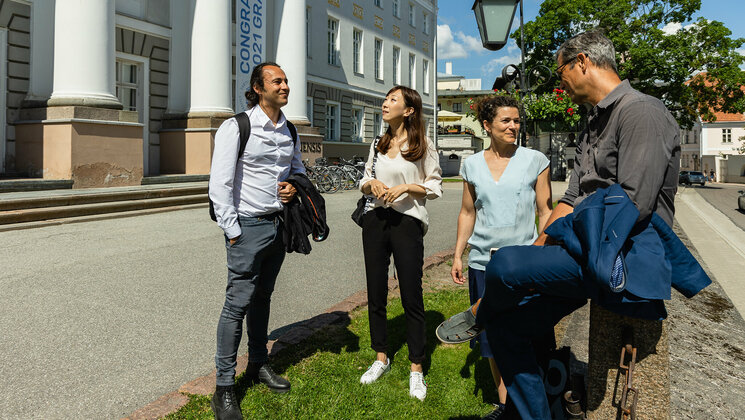Lecture series "The Stories of Buddhism"

Special open lecture series on Buddhism titled "The Stories of Buddhism", is scheduled from November 14th to the 29th. This series is designed to provide an introduction by renowned experts in Buddhist Studies to the various aspects of Buddhism, covering its historical origins to contemporary developments, and offering a comprehensive overview of the philosophy, practices, and cultural significance of Buddhism. We extend a warm invitation to all those interested in attending the lectures.
All lectures and seminars start at 18:00.
Registration:
All those interested are warmly welcome to attend the lectures. Please confirm your attendance by contacting mart.tsernjuk@ut.ee.
If desired, you can also earn 2 ECTS credits by enrolling in the course "The Story of Buddhism" through the Study Information System (SIS).
After locating the Buddha in time and space, and in his social and intellectual environment, I shall contrast his position in the religion he founded with the position of God (or Jesus) in Christianity. I shall briefly introduce his teaching method, and explain the assumptions he inherited about karma and rebirth.
Most of this lecture will explain three cardinal concepts: the self, dukkha (suffering) and nirvāna. Between them they constitute the Buddha’s soteriology (= theory of salvation).
Pāli originally meant “text for recitation”, but it has generally been used simply as the name of the Indian language in which the earliest record of the Buddha’s teachings has been preserved. This lecture will argue the case for accepting as correct the Buddhist tradition that it was the language used for preaching by the Buddha himself. It will also touch on the traditional Buddhist attitude towards textual material.
The word ‘Meditation’ has long used in Western scholarship and Buddhist practice as an umbrella term for complex of psychotechnics elaborated and practiced in all schools of Buddhism to transform practitioner’s mind and guide one towards Enlightenment/Awakening what is the goal of all Buddhist practices. At the same time, we hardly can find any original Buddhist term that accurately matches to this term of Western origin. In the lecture, Läänemets introduces the set of Buddhist terms for meditation and practices behind them. He also discusses the advantages and disadvantages of widespread use of ‘Meditation’ in descriptive language of modern Buddhology and Western Buddhism.
Tzu Chi as Engaged Buddhism (Brill 2012)
Yao’s book is the first comprehensive sociological account and in-depth analysis of a new Chinese Buddhist movement, known as Tzu Chi (otherwise, the Buddhist Compassion Merit Society). Based in Taiwan, it was founded in 1966 and still led by a female Buddhist master - Master Cheng Yen. Its members are laity, and women play a major role. The main focus of the movement is medical charity - to ease and if possible, prevent suffering and to teach ethics to the wealthy; at the same time, it also offers members a religion and a way of life. Recruitment typically attracts people from the urban middle class. With some 3.5 million members and a very low drop-out rate, Tzu Chi is extraordinarily successful, and has spread to other parts of the world, not least mainland China where it is attracting the attention of the general public and the media.
Yao’s book stands in the Anglo-American tradition of the sociology of religion; it also draws on the author’s knowledge of Buddhist history. The data come from participant observation and many long interviews. It will be of particular interest to students of new religious movements, religious studies in contemporary China, and studies in ethics and social change in East Asia.
Chinese Buddhism Today (Equinox 2022)
Fo Guang Shan, "Buddha's Light Mountain", is a Buddhist movement founded in Taiwan in 1967 and led by the Ven Hsing Yun (b.1927), who had fled to Taiwan from mainland China in 1949. It stands in the Chinese tradition of Mahāyāna Buddhism and more specifically is a form of Buddhism which in English is usually referred to as "Humanistic Buddhism" or as "engaged Buddhism". Humanistic Buddhism owes its origin to the Chinese monk Tai Xu (1890-1947). He found the Buddhism which surrounded him in China dreary and moribund, preoccupied with rituals for the dead, and offering nothing to help or guide people living in the world outside monasteries. His determination to reverse this decay centred on the idea that it was the vocation of a Mahayana Buddhist to do good to others, finding their own spiritual benefit in benefitting society. Hsing Yun has been a devoted disciple of Tai Xu. It is telling that he founded a seminary before he founded a monastery and has laid huge emphasis on education. As the sub-title of this book indicates, in order to make Buddhism widely attractive and relevant he has incorporated every influence available. Gifted with a benign personality, he has turned his seemingly boundless energy and prodigious versatility to creating an institution which presents Buddhism as potentially a source for benefitting society through making life enjoyable. This book hopes to convey the movement's ethos primarily by focusing on his views and activities.
The topics covered in the lectures are discussed in the seminar.
The topics covered in the lectures are discussed in the seminar.
Lecturers:
|
Image

|
Professor Dr. Richard F. Gombrich, is the Emeritus Professor of Sanskrit at Oxford University and a member of the Faculty of Asian and Middle Eastern Studies and Balliol College. He is the Founder and Director of the Oxford Centre for Buddhist Studies as well as the General Editor of the Clay Sanskrit Library. |
|
Image

|
Professor Dr. Yushuang Yao 姚玉霜, born in Taiwan, Dr. Yushuang Yao earned her BA in Philosophy from Fu Jen University. She holds an MA and a PhD from the University of London, King's College, and has received international accolades, including the CCK Presidential PhD Thesis Award and the Fulbright Scholarship. She's a research fellow at the Oxford Centre of Buddhist Studies, with numerous English publications. Currently, she's the Chair Professor at the Graduate Institute of Religious Studies at Fo Guang University in Taiwan, affiliated with the prominent Chinese Buddhist sect, Buddha's Light Mountain |
|
Image

|
Dr. Märt Läänemets is an Oriental and Buddhist scholar and instructor of meditation, former head of the Centre for Oriental Studies and associate professor at the University of Tartu, currently researcher of the Estonian Academy of Security Sciences. |
The course takes place within the project "Taiwan Studies Programme”.






